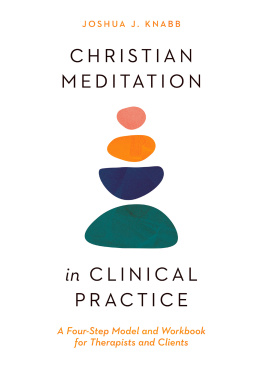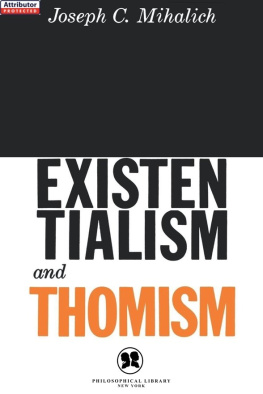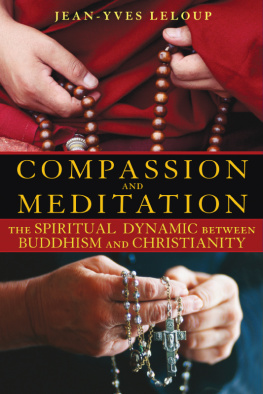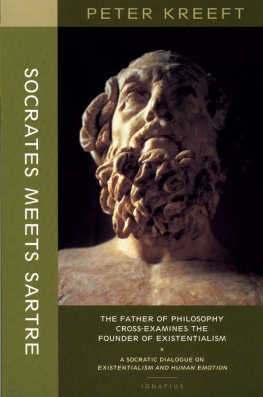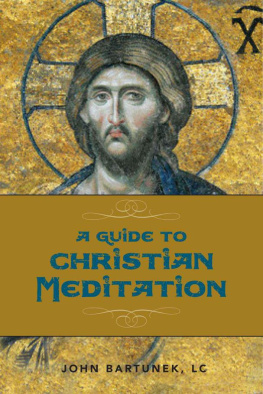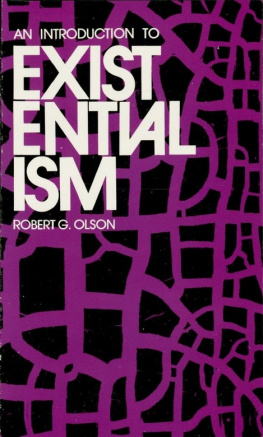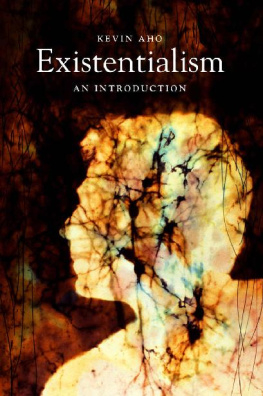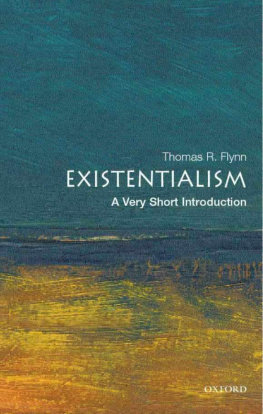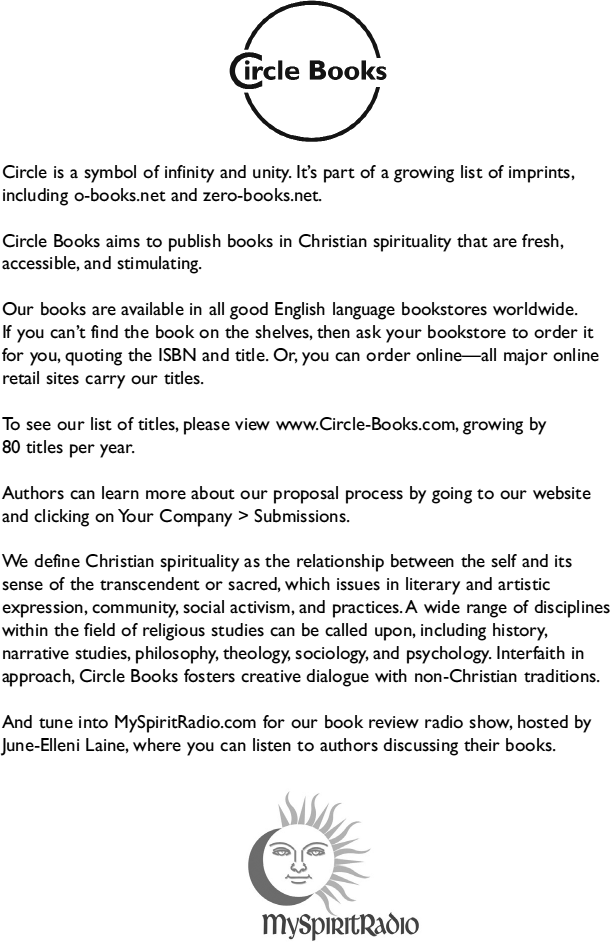References
Allen, James. As a Man Thinketh, 1992.
Barrett, William. Irrational Man: A Study in Existential Philosophy. New York: Doubleday Anchor Books, 1958.
Damasio, Antonio. Looking for Spinoza: Joy, Sorrow and the Feeling Brain. Harcourt, 2003.
French, Hal. Zen and the Art of Anything. Broadway Books, 1999.
Happold, F.C. Mysticism: A Study and an Anthology. Maryland: Penguin Books, 1963.
Heidegger, Martin. Being and Time. Translated by John Macquarrie and Edward Robinson. Harper Perennial, 1962.
Holmes, Ernest. The Science of Mind: A Philosophy, A Faith, A Way of Life. New York: Penguin Putnam, 1997.
Inwood, Michael. Heidegger: A Very Short Introduction. Oxford University Press, 1997.
Johnston, William. Christian Zen: A Way of Meditation. San Francisco: Harper & Row, 1979.
Kapleau, Philip. The Three Pillars of Zen: Teaching, Practice and Enlightenment. New York: Anchor Books, 1980.
Leong, Kenneth S. The Zen Teachings of Jesus. New York: Crossroads Publishing, 1995.
Mitchell, Stephen. A New English Version, Tao Te Ching. New York: Harper & Row, 1988.
May, Gerald G. The Awakened Heart: Opening Yourself to the Love You Need. San Francisco, HarperCollins, 1991.
May, Rollo. The Courage to Create. New York/London: W.W. Norton & Co, 1975.
Nowak, Paul. The Way of the Christian Samurai. 2005.
Polkinghorne, John. The God of Hope and the End of the World. Yale University, New Haven/ London, 2002.
Royce, Josiah. The Problem of Christianity. General-Books.net, 1913; reprint 2010.
Royce, Josiah. The Sources of Religious Insight. Charles Scribner Sons, 1912.
Sartre, Jean-Paul. Existentialism and Human Emotions. Wisdom Library, New York, 1957.
Snyder, C.R. The Psychology of Hope: You Can Get There from Here. Free Press, 1994.
1
The Practice of Self Realization
Philip Kapleau, in the preface to The Three Pillars of Zen, clearly holds that:
Briefly stated, Zen is a religion with a unique method of body-mind training whose aim is Self Realization At the profoundest level Zen, like every other great religion, transcends its own teachings and practices, yet at the same time there is no Zen apart from these practices. Attempts in the West to isolate Zen in a vacuum of the intellect, cut off from the very disciplines which are its raison detre, have nourished in places a pseudo-Zen that is little more than a mind tickling diversion. I believe that the Japanese school of Zen Buddhism has perhaps for thousands of years remained the most faithful to the original mindfulness practice of the Buddha that leads to enlightenment (satori).
(Kapleau 1980, 69)
Kapleaus book is about the closest a Westerner might get to a sense of the teachings of Zen Buddhism. Even people who have practiced a combination of various forms of Eastern and Western meditation find it difficult to read. It serves to give a genuine insight into Zen, while simultaneously portraying how difficult it is for a Western left-brain person to comprehend.
Kapleaus explanation of Zen, I have found, fits well with my heart, mind and most of all my existential wondering soul. In terms of existential philosophy and therapy, we wander and worry about the lack of meaning in postmodern society. Without meaning in our life, we are driven by our anxiety-based nature and all of its manifestations in the ego. In existentialism, the solution to our anxiety-driven wandering is found by reaching into the deepest elements of humanity. When we explore our being, the existentialist always returns to the core person that recognizes a call to live courageously:
A chief characteristic of this courage is that it requires centeredness within our own being, without which we would feel ourselves to be a vacuum. The emptiness within corresponds to an apathy without, and apathy adds up, in the long run, to cowardice. This is why we must always base our commitment in the center of our own being, or else no commitment will be ultimately authentic Courage is not a virtue or value among other personal values like love or fidelity. It is the foundation that underlies and gives reality to all other virtues and personal values. Without courage our fidelity becomes conformism.
(May 1975, 13)
In an existential analysis, our higher power is the discovery of mind.
Kapleau explains Zen as a religious practice. He does not say religious beliefs or institutions; rather it is a religious practice. It is a religious practice because in Zen there is a belief in the dharma, i.e. the proven way of Zen. Furthermore, Zen has a faith in the power of satori (enlightenment); in other words, it has a belief in the higher mind. In Zen, like existentialism, there is no unconscious mind; there is only the mind. If you ask a true Zen master where the mind is, then he will tell you, The mind is where you focus. In Zen, there is a salvific belief in the discovery of the Original Mind. It is where we go to find our true nature, and it is by means of our Original Mind that we find the solution to pain, suffering and anxiety:
If you would free yourself of the sufferings of samsara (the law of causation), you must learn the direct way to become a Buddha. This way is no other than the realization of your own mind. Now what is this mind? It is the true nature of all sentient beings, that which existed before our parents were born. This mind is intrinsically pure. When we are born, it is not newly created, and when we die, it does not perish. It has no distinction of male or female, nor has it any coloration of good or bad. It cannot be compared with anything, so it is called Buddha nature. Yet countless thoughts issue from this self-nature as waves arise in the ocean or as images are reflected in the mirror.
To realize your own mind you must first of all look into the source from which thoughts flow. Sleeping and working, standing and sitting, profoundly ask yourself, What is my own mind? with an intense yearning to resolve this question. This is called training or practice or desire for truth or thirst for realization.
(Kapleau 1980, 193)
2
The Existential Center
What we have here from the perspective of an existential analysis is the courageous pursuit of meaning that awaits us at the center of our existence. Perhaps the existential core that is discovered in contemplation, art, music and poetry is somewhat similar to this Zen Mind. It takes a courageous effort of time and practice to come to enlightenment and belief in the dharma of the Original Mind. It takes a courageous belief in the teachings of the Zen masters to trust them and enter on the journey to the Original Mind. In Zen, the true self is like the moon that cannot be seen because it is covered by the clouds. The Zen clouds are the three delusions of anger, greed and ignorance.
Anxiety is a combination of thoughts and feelings that comes from the ego driven by the need for self-esteem, affluence and the lack of courage to look for our true self. The three delusions clearly address the issue of anxiety and removing the anxiety clouds that keep us from the Original Mind. It has been my experience over the years as a pastor that anxiety and anger always go together. Why are people who have so much affluence in their life so angry? Why do Western Christians become increasingly angry at non-believers and the world? Why is anger and intolerance increasing? Anxiety is the driving emotion of the angry ego, and we fight in vain against anger with left-brain practices of rational insight and preaching. The overcoming of anger in Zen is achieved with the practice of Zazen.


